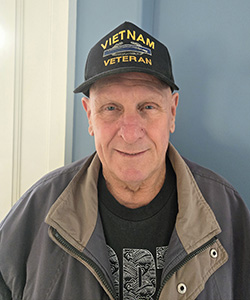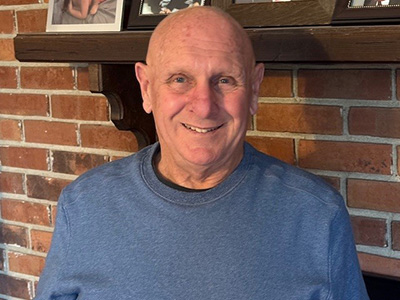Army Vietnam War Orland Park, IL Flight date: 04/09/25
By Charlie Souhrada, Honor Flight Chicago Veteran Interview Volunteer
Doug Ermel was born December 31, 1948, and narrowly missed being Chicago’s first child of the New Year by a couple of hours. That timing quirk brought his family luck and set the tone years later during his experiences in Vietnam. “My parents were elated because they got to deduct me for the whole year,” he says.
Life wasn’t easy, however, as his parents, Doug and Marie, eventually welcomed four additional children – three daughters and one more son, making Doug the eldest in a bustling household where money was tight. “There were times we didn’t get enough to eat and were on the verge of poverty. It wasn’t all roses, that’s for sure!”
Doug helped pay expenses, including his Catholic school tuition and books, by holding down paper routes, making pizzas, servicing trucks and working as a construction apprentice during the summer months. But growing up wasn’t all work and no play. He fondly remembers playing football in grammar and high school and still meets several high school friends for breakfast every few months.
In 1967, Doug graduated from Marist High School, Chicago, as part of the school’s first graduating class. He then enrolled in accounting courses at Bogan Junior College (later renamed Richard J. Daley College), with dreams of becoming a CPA.
One year later, his life turned when his draft notice arrived on the first day of the Democratic National Convention in Chicago. “I had two deferments, one for serving as a sprinkler fitter apprentice, the other for being a full-time college student taking classes at night,” he says. “But this was around the time of the Tet Offensive. The military needed people and didn’t care if you had a deferment!”
After passing a physical, Doug was put on a plane and sent to Fort Polk (now Fort Johnson), in Vernon Parish, Louisiana, for basic training. “There was South Fort Polk which was newer, and North Fort Polk, which was around during World War II,” he says. “You took your basic in South, then if you went to North, it was ‘Tiger Land,’ set up for people going to Vietnam. You knew where you were going once you hit North!”
That’s exactly what happened to Doug. After completing basic, he was sent to North Fort Polk for advanced individual training. There, his military occupational specialty (MOS) was 11 Bravo, the designation for a soldier trained as an infantryman. In January 1969, his AIT scores earned him a trip to Fort Benning, Georgia, and a spot in the Army’s Noncommissioned Officer (NCO) school. At the time, the Army needed squad leaders, and the term “shake and bakes” referred to rapidly trained and promoted soldiers who were needed to fill a leadership void. “I figured if I went to NCO school for two months in the states, then put in one year over there, I’d come home with 150 days or less remaining and they’d let me of the Army, which was common practice.”
That scenario did play out, but instead of completing the NCO course, Doug dropped out at a friend’s suggestion. “A friend, who served as the company clerk, suggested that demolitions training would likely earn a spot in South Korea clearing mines in the demilitarized zone,” he says. “I told 10 friends who also were taking the NCO course, and all of us dropped the same day then sat waiting for orders.” When the orders came two days later, the gamble paid off for his friends, all of whom were assigned to clear mines in Korea. “I was the only one who got sent to Vietnam and here it was my idea!”


Feeling like his luck had run out, Doug flew from Fort Dix, New Jersey, to Bien Hoa in the Mekong Delta in April 1969. “If you saw the movie ‘Platoon,’ where the young guys are getting off the plane and the other ones are getting on … that’s what I experienced. We were getting off the plane thinking ‘my God, what happened to those guys?!?’”
Aside from the initial shock of seeing grizzled veterans leave Vietnam, he also found the heat and humidity so intense that he felt he couldn’t breathe and began to wonder if he’d make it home.
He found slightly better conditions when he was assigned to Camp Enari, a base camp in the Central Highlands. On his first day at base camp, Doug and two other soldiers were assigned to Bravo Company and thought they had it made. The next morning, the three were reassigned to Charlie Company to replace three soldiers who were killed the night before.
“Going out there, we were in a convoy, took sniper fire, and had to get off our truck and walk,” he remembers. “We walked two miles, took mortar fire, found a tank, and hopped on the tank to catch a ride to company headquarters. We got 20 feet and hit a landmine. That was my first three hours out in the field.”
At company headquarters, he was assigned to serve in the 4th Infantry Division Charlie Company, 2nd Battalion, 8th Infantry Regiment. In that deployment, he led his platoon in daily morning sweeps, afternoon patrols, and night ambushes. It was a harsh world of thick jungles, long days, limited supplies, and the constant threat of danger.
“The platoon I was with was all North and South Carolinians. They were still fighting the Civil War and here I was from Chicago. So, my code name was “Yank,” he says. “It took me three weeks to gain their respect and that’s why I walked point every time. I was in charge and point was the worst job. By taking that short straw, I showed them respect and they returned it with loyalty.”
One day, while Doug was walking point, an enemy popped out of a spider hole and came at him with an AK-47. “He was 10 feet away and missed me with every round,” he says. “I could feel the compression from the muzzle of his gun and thought my legs were gone. He later discovered his baggy jungle fatigues had four bullet holes in them. “How can you miss from 10 feet away?”
According to Doug, the average Vietnam-era infantry soldier saw 256 days of combat. The conditions were grueling, demanding physical and mental resilience. He recalls being so far in the jungle that when the U.S. landed on the moon, his platoon didn’t hear about it until three weeks later.
“We were in combat every day and Sundays were 10 times as bad,” he remembers. “I could tell you the exact number of days, months, even the minutes before I went home. I kept a running tally!”
After a year of combat, he returned home to the Chicago area amidst a whirlwind of emotions. “It was so weird,” he says.” One day, you were walking around with grenades, ammunition and a rifle, the next you were in street clothes and back on the block. It happened that fast and it was hard to get your head around it!”
Back home, he leveraged the GI Bill to take night classes while working long hours for Sprinkler Fitters Local 281. “It got hard working all those hours then going to school full time. I said the heck with it and instead of getting money for college, I got money for my apprenticeship.”
In August 1971, he married his wife, Nancy, and settled in an apartment in Chicago Ridge before purchasing a starter home in Country Club Hills. Five years later, he designed and managed construction of the couple’s dream home in Orland Park, where they raised their three children – Steve, Danny, and Lindsay.
After 25 years of marriage, the couple divorced. Doug kept the house, and continued to develop his career, advancing to foreman and responsible for numerous, significant construction projects. Now retired after a 42-year career, he focuses on his health, enjoys spending time with his family and seven grandchildren, and is beginning to tell his Vietnam story at local schools.
“Somehow I made it through,” he says. ”If I could make it through Vietnam, I could do anything … it couldn’t get any worse!”
Welcome home, Doug, and thank you for your service. We hope you enjoy your Honor Flight!


